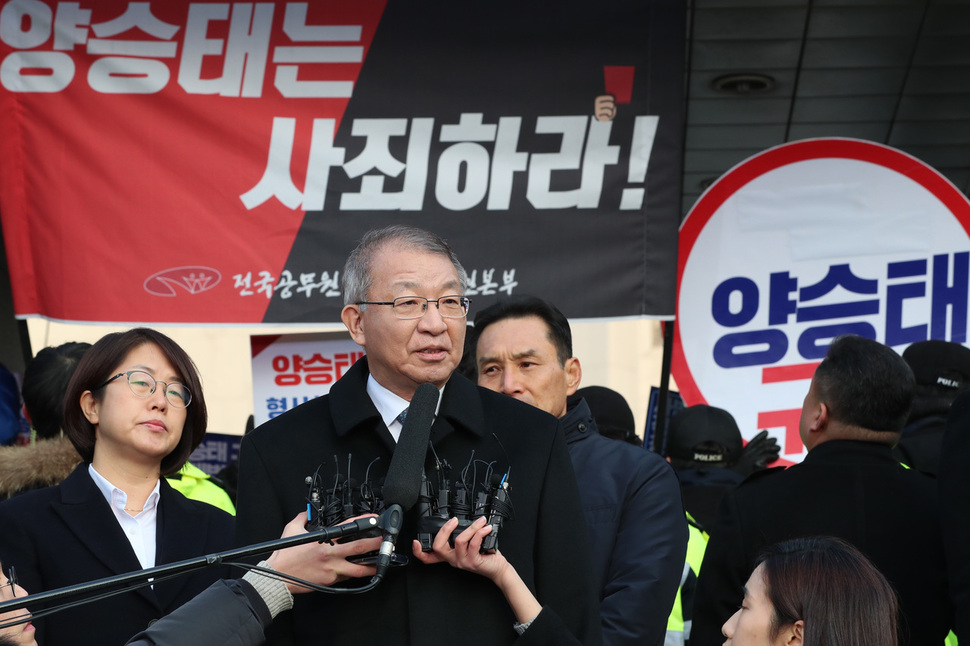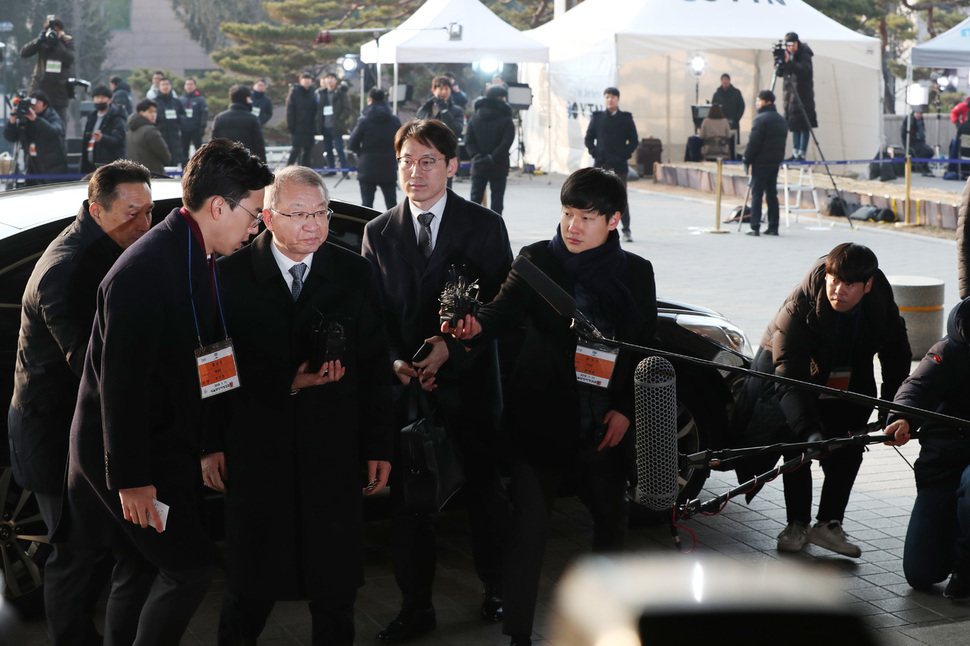Posted on : Jan.12,2019 16:59 KST
Modified on : Jan.12,2019 17:05 KST
 |
|
Former Supreme Court Chief Justice Yang Seung-tae delivers a statement in front of the Supreme Court building in Seoul on Jan. 11 before his questioning by prosecutors regarding allegations of judicial misconduct. (Kim Jung-hyo, staff photographer)
|
Yang Seung-tae offers no apology and shifts blame to others
January 11 went down as an ignominious day for South Korean judicial history as a former head of the judiciary was summoned before prosecutor for the first time in the history of Constitutional government. Appearing before the public after a long seven months spent confined to his home, the former Supreme Court Chief Justice consistently denied any legal responsibility and shifted the blame to others. He offered no frank apology for the public scarred by the judicial scandal, or for the courts now suffering with the public’s distrust. It was a day where trust in the judiciary slid to new depths.
As previously announced, former Supreme Court Chief Justice Yang Sung-tae appeared in front of the Supreme Court building in Seoul’s Seocho neighborhood at 9 am on Jan. 11 to deliver his position statement. In the process, he also disregarded claims by critics that he was attempting to use the court as a “shield.”
“Those people.” “Our courts.” “An absolute majority of judges.”
In all of the remarks shared by Yang, it was difficult to find any that placed himself as the subject. He distances himself from the current and former judges investigated for judicial corruption, referring to them as “those people.” While he did make reference to the “outcome of my own failings” and “carrying that” moral responsibility, he drew a clear line on the matter of legal responsibility. Judicial observers said they had “seen it coming,” but were still dismayed at the former head of the judiciary’s efforts to shift the blame.
In his position statement, Yang said, “Many of the judges implicated in this case have said that they did not do anything to violate the law and their conscience at least in performing their individual roles, and I believe them.”
At the same time, he added, “If it is determined in the future that some fault lies with those people, that too is my responsibly, and I will carry that.” His argument was that he was completely unaware of any judicial corruption during his tenure, and that any illegal actions that did take place were committed independently by judges.
 |
|
A former Supreme Court chief justice stood before prosecutors for the first time in South Korean judicial history at Seoul Central District Prosecutors’ Office on Jan. 11.
|
Claims responsibility for nothing
Referring to his questioning by prosecutors, Yang said, “I will provide sufficient explanation to clear up any misunderstandings that may exist.”
“I look forward to this case being resolved from a fair position without prejudice or preconceptions,” he added. When asked by reporters whether he acknowledged the evidence of interference in trials and judicial appointments that emerged during the prosecutors’ investigation, he stressed that the absence of any improper involvement was “an unchanged fact.” Yang similarly insisted that “absolutely no such thing happened” in his so-called “playground press conference” on June 1 of last year.
“He claims he did nothing wrong and bears responsibility for nothing. He maintains that if the judges below him did anything wrong, he did not order it or implicitly agree to it,” said one judge.
“It’s a defense argument, where he is claiming there was no abuse of his authority,” the judge concluded.
While Yang was delivering his five-minute “wall statement” in front of the Supreme Court building, the court employees’ union and victims of the judicial scandal chanted phrases including “Arrest Yang Sung-tae” and “Yang Sung-tae must stand before the cameras as a suspect.” Yang subsequently made his way to the Seoul Central District Prosecutors’ Office, where he proceeded directly to the Supreme Prosecutor’s Office (SPO) without standing for photographs as ex-presidents Lee Myung-bak and Park Geun-hye had done. In response to his delivery of his remarks before the Supreme Court rather than before the cameras at the SPO, observers in and around the courts blasted him for “clinging to his sense of imperial prerogative.”
Following his press conference at the Supreme Court’s main gate at 9 am on Jan. 11, Yang proceeded immediately to the nearby Seoul Central District Prosecutors’ Office for questioning, which began at 9:30 that morning. He departed the prosecutors’ complex at around 11:55 at night. Yang remained tight-lipped as he boarded his vehicle hope after questioning, just as he had done when he passed by the cameras earlier that morning. The former Chief Justice reportedly either denied all accusations concerning a “judges’ blacklist” and interference in trials involving labor conscription by Japanese companies guilty of war crimes, or said he had “no recollection.” Prosecutors plan to summon him back for one or two rounds of undisclosed additional question before determining whether to request a warrant.
By Kim Yang-jin, Lim Jae-woo, Choi Woo-ri, Jang Yee-ji and Yi Ju-been, staff reporters
Please direct comments or questions to [english@hani.co.kr]










